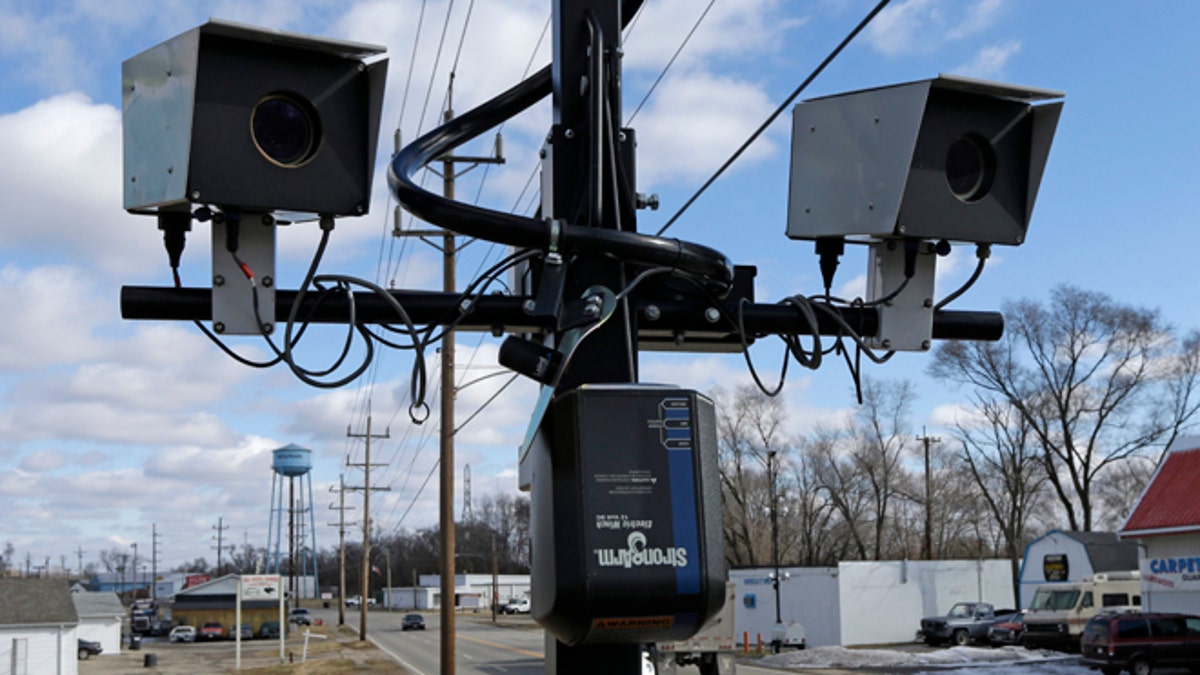
Feb. 25, 2014 : This photo shows speed cameras aimed at U.S. Route 127 in New Miami, Ohio. (AP)
Angry motorists are fed up with having to shell out big bucks to pay fines generated by red light cameras and speed cameras.
Take Jim Mehlhaff, an elected municipal official in Pierre, S. D. He got a speed camera ticket on busy I-29 in Sioux City, Iowa. He was fined $168.
“I had to mail the fine to ‘Sioux City Saves Lives,’ which was annoying,” he told FoxNews.com. “I crossed that out and put on the envelope ‘Sioux City Extorts Money from Out of State Travelers.’ They still the cashed the check.”
Complaints from Mehlhaff and others recently prompted South Dakota lawmakers to act. They passed a bill to put the brakes on red light cameras in the state and to bar red light vendors from going after South Dakotans for citations from other states. Republican South Dakota Gov. Dennis Daugaard signed the bill into law last week.
The new law makes South Dakota the sixteenth state to stamp out red light cameras and speed cameras by statute or state court ruling, according to TheNewspaper.com. Other states, including Missouri, Ohio and Florida, are considering similar prohibitions.
Critics complain the cameras violate due process, don’t make intersections safer and generate revenue more for the red light vendor than the community.
The pushback is being felt around the country. The number of towns and cities that use cameras to catch motorists running red lights or speeding has dropped six percent since 2012, from 540 to 506, according to the Insurance Institute for Highway Safety. About 130 communities use speed cameras. An unknown number use both.
“You’re starting to see more public backlash against cameras,” said John Bowman of the National Motorists Association. “People are finally starting to realize what cameras are all about and public officials don’t want to experience all of the problems associated with cameras: legal entanglements, lawsuits, class-action lawsuits, unfavorable contract terms with cameras.”
But Russ Rader, a spokesman for the Insurance Institute for Highway Safety, said red light cameras are a useful tool to keep communities safe. They are effective in reducing accidents, even at intersections that don’t have them, he said.
He said there is an explanation for the shrinking market for cameras. In some places, people avoid running red lights or speeding if they know there is a camera watching.That causes fewer citations to be issued. “As the numbers fall, they are no longer self-supporting,” he said.
But as the market has gotten smaller, so have the profits of the companies that install the cameras.
Brekford, based in Maryland, reported last week that it is losing money. The firm told Wall Street that it faces a deficit of $9 million and that revenues had dropped 25 percent from $18 million to $13 million in the past year. It reported a net loss in 2013 of $1.4 million.
"The increased net loss when comparing 2013 to 2012 was due to increased expenses related to salaries, benefit programs and associated support costs for the expansion of (photo ticketing) programs without corresponding increases in revenue as certain program implementations were delayed or terminated," Brekford said in a news release.
Brekford's biggest problem was its loss of the speed camera contract in Baltimore because of problems.
Redflex Traffic Systems in Phoenix has even bigger headaches. The firm has been the subject of a federal bribery investigation in Chicago for the past year.
In its most recent financial reports, Redflex said the loss of the Chicago contract cost the company $9 million. That and other write-offs resulted in a14 percent decrease in after-tax profit in the last six months, the company said.
Redflex did not immediately respond to a request for comment.
Mehlhaff said his speed camera ticket cited him forgoing 68 MPH, 13 miles over the speed limit. He said he knows three others who got speed camera tickets on I-29 in Sioux City for going just as fast,“68 in a 55.”
“I thought it was odd,” he said.
He called the camera speed ticket a violation of due process. “You don’t get to plead your case on the spot and you don’t even get the satisfaction of saying, ‘My bad,’” he said.
One person who is not pleased with what South Dakota has done is Sioux City Police Chief Doug Young. He told FoxNews.com lawyers for the department are weighing legal action.
“There is due process,” he said. “It’s clearly marked that speed cameras are being used. Yet, these people still ignore that.”

